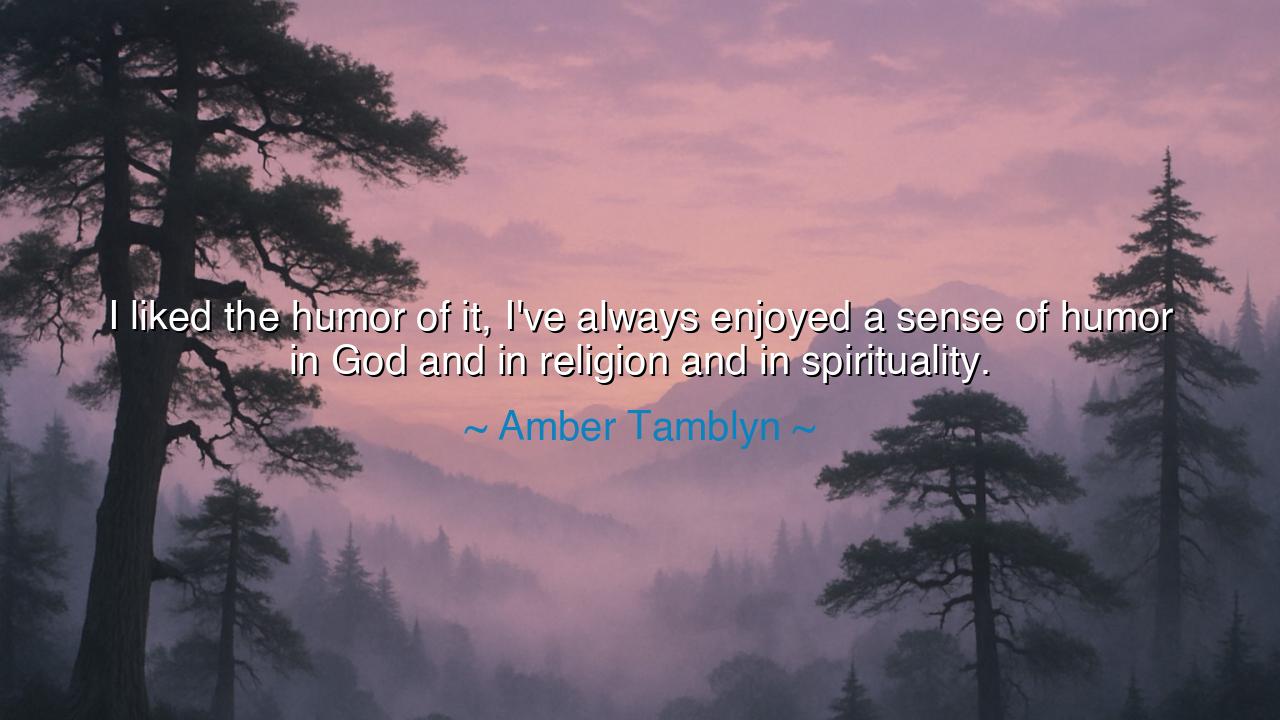
I liked the humor of it, I've always enjoyed a sense of humor in
I liked the humor of it, I've always enjoyed a sense of humor in God and in religion and in spirituality.






In the grand journey of the soul, we are often taught that spirituality is a solemn path, one marked by reverence, contemplation, and gravity. Yet, in the deep folds of human experience, there exists a powerful truth—a truth that has echoed across the ages in the teachings of wise men and women: humor, in all its forms, has a place even in the most sacred of realms. Amber Tamblyn, in her words, reflects a wisdom that is ancient and profound: "I liked the humor of it, I've always enjoyed a sense of humor in God and in religion and in spirituality." What she reveals is the understanding that the divine, the eternal, is not merely a source of solemnity, but a wellspring of joy, of laughter, and of play—an energy that transcends our earthly constraints and reminds us that life, in all its mystery and wonder, is to be approached with both reverence and mirth.
Consider the sacred texts of old—the Hebrew scriptures, the Bhagavad Gita, the teachings of Buddha. While often heavy with wisdom and truth, these texts are not devoid of humor. The story of Moses, for instance, leading his people through the wilderness, facing trials and tribulations, is filled with moments of both despair and profound levity. Even in the face of the greatest trials, the ability to laugh, to find lightness in the darkest moments, is a sign of wisdom. Tamblyn's words echo this ancient insight: humor is not the antithesis of spirituality, but rather a companion to it. Just as we laugh at the folly of humanity, so too can we laugh at our own misunderstandings, our own struggles in the divine order.
This recognition of humor in religion and spirituality is not without precedent. In Greek philosophy, Socrates often used humor to challenge the rigid structures of society, to provoke thought, and to enlighten. His humor was not the light-hearted jest of a common fool, but the sharp wit of a philosopher seeking truth in a world filled with contradictions. Socrates understood that true wisdom requires the ability to laugh at the absurdity of the world, to see the divine hand even in the most puzzling or humorous of circumstances. So too, in Christianity, the figure of Jesus often used parables filled with wit and irony to reveal the deeper truths of the kingdom of heaven. Through humor, the sacred truths of the universe could be delivered in a way that was both accessible and profound.
We must also consider the Sufis, the mystical branch of Islam, who are known for their humor and joyous spirituality. The great poet and mystic Rumi was not just a philosopher of deep truths but also a master of playful wisdom. In his poetry, he often weaves humor into the profound, using laughter as a tool for spiritual awakening. The Sufis knew that to be too serious in the pursuit of the divine was to miss the joy of the journey. Tamblyn's love for the humor in spirituality speaks to this same tradition—a recognition that laughter, play, and joy are as essential to the soul's growth as any solemn prayer or meditation.
The lesson here is profound. Humor is not an obstacle to spirituality; rather, it is a means of deepening it. The divine, whether understood as God, universal energy, or the great unknown, is not a distant, stern figure, but one that delights in the fullness of life. The ability to find humor, even in the trials and tribulations of existence, is a mark of spiritual maturity. It is a reminder that life is not meant to be endured with a somber heart, but to be celebrated, even in its absurdities. For spirituality is not about fleeing from life’s difficulties but embracing them fully, with grace, with laughter, and with love.
And so, let us take heed of Tamblyn's words and reflect on the role of humor in our own spiritual lives. Embrace the joy of the divine in all its forms. Find laughter in the small moments, in the simplicity of a smile, in the playfulness of creation. Let us not take ourselves so seriously that we forget to celebrate the beauty of being human. In every challenge, there is an opportunity for humor, for lightness, and for growth. Let us see the divine not only in the solemnity of prayer but in the joy of living, in the moments that make us laugh and remind us of the beauty and mystery of the universe.
As we walk our paths, let us seek the balance that Tamblyn calls for—the balance between reverence and joy, between the sacred and the playful. Let us recognize that the divine, in all its forms, invites us to approach life with both awe and merriment, and in doing so, we shall find a deeper connection to the universe, to one another, and to the self. For in the laughter of the soul, we find not only healing but the very essence of our existence.






AAdministratorAdministrator
Welcome, honored guests. Please leave a comment, we will respond soon